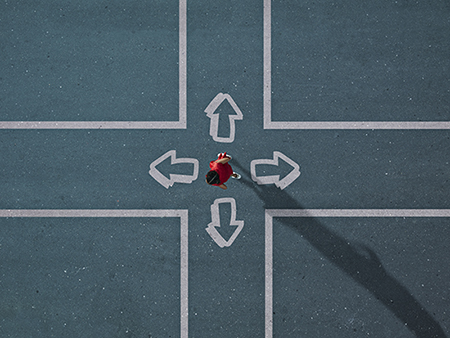 During the COVID-19 pandemic, many people have had to make big decisions for themselves and their families. When it comes to the health and safety of the ones you love, choosing whether to take a risk can be a confusing and daunting task.
During the COVID-19 pandemic, many people have had to make big decisions for themselves and their families. When it comes to the health and safety of the ones you love, choosing whether to take a risk can be a confusing and daunting task.
The decision of whether or not to travel, go to the grocery store or eat outdoors at a restaurant is one that each person will have to make, and each decision will look different.
University of Alabama at Birmingham’s Joshua Dobias, Ph.D., assistant professor in the College of Arts and Sciences’ Department of Psychology, says that making these kinds of decisions is dependent upon several factors and is unique to each individual.
Age
When it comes to taking risks, a person’s age can play a huge role in the process of making decisions.
“As you age, your frontal lobe in your brain develops,” Dobias said. “For most people, the lobe is not fully developed until their 20s.”
Life experiences
Beyond the development of your brain, the older you are, the more firsthand knowledge you have. Decisions you make in the present are dependent upon what you have experienced in the past.
Everyone has their own unique personal history and learning, and this influences behavior and choices.
Perception
Deciding whether or not to participate in activities, even ones that follow health and safety guidelines, can be a difficult choice for some.
Dobias says that a contributing factor to making decisions is a person’s risk perception and whether it is greater than their need to act.
“Everyone has their own perception of risk during the pandemic,” Dobias said. “For example, a person might have a great fear of COVID but is willing to stand in line to vote because their need to act on their civic responsibility is greater than the risk.
For someone else, the risk of being in a public setting is not worth the reward they would feel of voting in person, so instead they decide to fill out a mail-in ballot.”
| Click here to learn how to wash your hands properly. |
If one does decide that the reward will be greater than the risk, they should adhere to all of the safety guidelines that the Centers for Disease and Control has implemented, such as wearing a mask, maintaining 6 feet of distance and performing proper hand hygiene.
Overall, there are a large number of factors — even factors outside of one’s awareness — that will contribute to any decision made. These factors, and the outcomes of each conclusion, are going to be different for everyone.
“Don’t base your decision upon what choices your friends or family makes,” Dobias said. “You have to look at your situation and determine what is going to be the best for you given the risks involved.”
